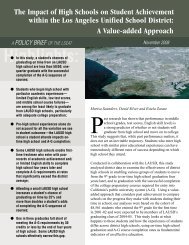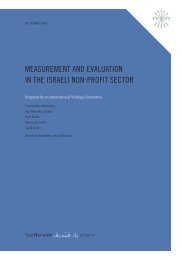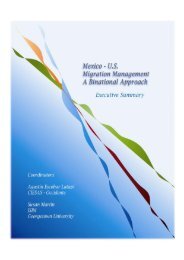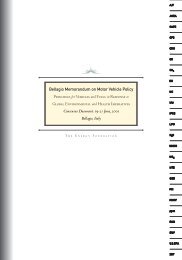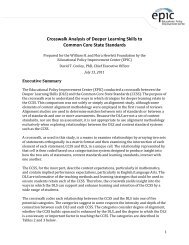EDUCATION FOR LIFE AND WORK - Hewlett Foundation
EDUCATION FOR LIFE AND WORK - Hewlett Foundation
EDUCATION FOR LIFE AND WORK - Hewlett Foundation
You also want an ePaper? Increase the reach of your titles
YUMPU automatically turns print PDFs into web optimized ePapers that Google loves.
Education for Life and Work: Developing Transferable Knowledge and Skills in the 21st Century<br />
10 <strong>EDUCATION</strong> <strong>FOR</strong> <strong>LIFE</strong> <strong>AND</strong> <strong>WORK</strong><br />
o<br />
o<br />
Priming student motivation by connecting topics to students’<br />
personal lives and interests, engaging students in collaborative<br />
problem solving, and drawing attention to the knowledge and<br />
skills students are developing, rather than grades or scores.<br />
Using formative assessment to: (a) make learning goals clear<br />
to students; (b) continuously monitor, provide feedback, and<br />
respond to students’ learning progress; and (c) involve students<br />
in self- and peer assessment.<br />
For instruction focused on development of problem-solving and metacognitive<br />
competencies, the committee recommends (see Chapter 6):<br />
• Recommendation 5: Designers and developers of curriculum, instruction,<br />
and assessment in problem solving and metacognition<br />
should use modeling and feedback techniques that highlight the<br />
processes of thinking rather than focusing exclusively on the products<br />
of thinking. Problem-solving and metacognitive competencies<br />
should be taught and assessed within a specific discipline or topic<br />
area rather than as a stand-alone course. Teaching and learning of<br />
problem-solving and metacognitive competencies need not wait until<br />
all of the related component competencies have achieved fluency.<br />
Finally, sustained instruction and effort are necessary to develop<br />
expertise in problem solving and metacognition; there is no simple<br />
way to achieve competence without time, effort, motivation, and<br />
informative feedback.<br />
Research on teaching and learning of competencies in the intrapersonal<br />
and interpersonal domains is less extensive and less rigorous than the research<br />
on deeper learning of cognitive knowledge and skills. Our review<br />
of the emerging research on these domains, as well as the more extensive<br />
cognitive research, suggests that the instructional features supporting development<br />
of transferable competencies in the cognitive domain may also<br />
support transfer in these domains (see Chapter 6):<br />
• Conclusion: The instructional features listed above, shown by research<br />
to support the acquisition of cognitive competencies that<br />
transfer, could plausibly be applied to the design and implementation<br />
of instruction that would support the acquisition of transferable<br />
intrapersonal and interpersonal competencies.<br />
Copyright © National Academy of Sciences. All rights reserved.





